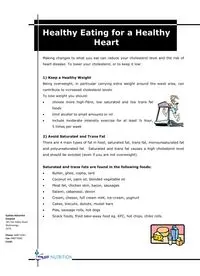Table Of ContentHealthy Eating for a Healthy
Heart
Sydney Adventist
Hospital
185 Fox Valley Road
Wahroonga
2076
Phone: 9487 9581
Fax: 9487 9583
Email:
Making changes to what you eat can reduce your cholesterol level and the risk of
heart disease. To lower your cholesterol, or to keep it low:
1) Keep a Healthy Weight
Being overweight, in particular carrying extra weight around the waist area, can
contribute to increased cholesterol levels.
To lose weight you should:
choose more high-fibre, low saturated and low trans fat
foods
limit alcohol to small amounts or nil
include moderate intensity exercise for at least ½ hour,
5 times per week
2) Avoid Saturated and Trans Fat
There are 4 main types of fat in food; saturated fat, trans fat, monounsaturated fat
and polyunsaturated fat. Saturated and trans fat causes a high cholesterol level
and should be avoided (even if you are not overweight).
Saturated and trans fats are found in the following foods:
Butter, ghee, copha, lard
Coconut oil, palm oil, blended vegetable oil
Meat fat, chicken skin, bacon, sausages
Salami, cabanossi, devon
Cream, cheese, full cream milk, ice-cream, yoghurt
Cakes, biscuits, donuts, muesli bars
Pies, sausage rolls, hot dogs
Snack foods, fried take-away food eg. KFC, hot chips, chiko rolls.
Healthy Eating for a Healthy
Heart
Sydney Adventist
Hospital
185 Fox Valley Road
Wahroonga
2076
Phone: 9487 9581
Fax: 9487 9583
Email:
3) Small Amounts of Monounsaturated Fat and Polyunsaturated Fat
Both monounsaturated and polyunsaturated fats help reduce cholesterol. You
should consume these fats in place of saturated fat. If you are overweight, only
have small amounts of these fats.
4) Eat More Soluble Fibre
There are two types of fibre; insoluble and soluble fibre. Insoluble fibre, found in
wheat bran, fruit and vegetables helps prevent constipation. Soluble fibre, found in
fruits, vegetables, rice bran and legumes helps reduce cholesterol levels.
5) Limit Foods Containing Cholesterol
Cholesterol is only found in some animal foods. Foods high in cholester-
ol are egg yolks, prawns, calamari, octopus, brains, kidney and liver.
Dietary cholesterol can raise blood cholesterol levels, however saturated
fat has a much greater effect. Some food products have no cholesterol but are still
high in saturated fat.
6) Limit Alcohol Consumption
Alcohol does not raise blood cholesterol, but it can raise triglycerides, blood pres-
sure and body weight. If you do consume alcohol, limit yourself to two standard
drinks per day (both men and women). Ensure that you have at least two alcohol
free days a week.
1 Standard Drink is equal to: 100 ml Wine, 425 ml Lite Beer, 375 ml Full Strength
Beer, 30 ml Spirit or 60 ml Fortified Wine.
High in monounsaturated fat
High in polyunsaturated fat
Avocado
Olive oil
Canola oil
Nuts and seeds
Canola and olive oil margarines
Polyunsaturated margarines
Sunflower oil, safflower oil
Corn oil, soybean oil
Fish and fish oil
Nuts and seeds.
Healthy Eating for a Healthy
Heart
Sydney Adventist
Hospital
185 Fox Valley Road
Wahroonga
2076
Phone: 9487 9581
Fax: 9487 9583
Email:
7) Limit Salt Consumption
The Australian Heart Foundation recommends ALL Australians reduce the amount
of salt they eat. Reducing dietary salt can lower your blood pressure and reduce
the risk of stroke and cardiovascular disease. Try to limit your salt intake to 1-2g/
day (1/2—1 tsp) or 1000-2000mg sodium per day.
Tips to reduce your salt intake:
Choose ‘No Added Salt’ or ‘Low Salt’ processed foods
Avoid using salt when cooking
Limit highly processed foods such as bacon, sausages, processed meats, to-
mato sauce and frozen meals
Avoid using salt at the dinner table
Choose fresh foods rather than canned ones
Use spices and herbs when cooking rather than salt
Check the nutrition panel and choose foods with less than 600 mg sodium
per 100g
8) Eat More Fruit, Vegetables, Wholegrain Breads and Cereals, Pasta, Rice
and Beans
An easy tool to help follow the recommendations discussed on the previous pages
is the Australian Guide to Healthy Eating. It shows you which foods to eat most,
which foods to eat moderately and which foods to eat in small amounts.
Healthy Eating for a Healthy
Heart
Sydney Adventist
Hospital
185 Fox Valley Road
Wahroonga
2076
Phone: 9487 9581
Fax: 9487 9583
Email:
The foods to EAT MOST are high in carbohydrate. They are low in fat, high in fibre
(both insoluble and soluble) and should be the basis of healthy eating. This group
includes wholegrain cereals, wholemeal breads/rice/pasta, fruit, vegetables and
legumes (dried peas, beans and lentils). Legumes are a good source of both carbo-
hydrate and protein.
The foods to EAT MODERATELY are protein-containing foods. The protein foods
are meat, fish, poultry, eggs, dairy/soy products and nuts. Meat, poultry and dairy
foods can be high in saturated fat, so choose the low fat or no fat options.
The foods to EAT IN SMALL AMOUNTS are high in fat, added sugars and salt. It
is important to avoid saturated fats and replace these with monounsaturated and
polyunsaturated fats. If you are overweight replace saturated fats with carbohy-
drate foods or reduce overall fat and energy intake a little bit at a time.
HYDRATION is very important for healthy living and a healthy body, aim to drink
at least 2L of fluid, preferably water, each day for good health.
FURTHER INFORMATION
Our outpatient Dietitian is located within the hospital and can also help you with
maintaining a healthy weight (increasing or decreasing) and provide a full dietary
analysis to measure dietary adequacy. Please call to make an appointment
(02) 9487 9581.
Sydney Adventist Hospital, 2010
Prepared by the Accredited Practising Dietitians of the Sydney Adventist Hospital
A service operated by Sydney Adventist Hospital, a division of Adventist HealthCare Limited
© Adventist HealthCare Limited 2010
Prepared by the Accredited Practising Dietitians of the Sydney Adventist Hospital

